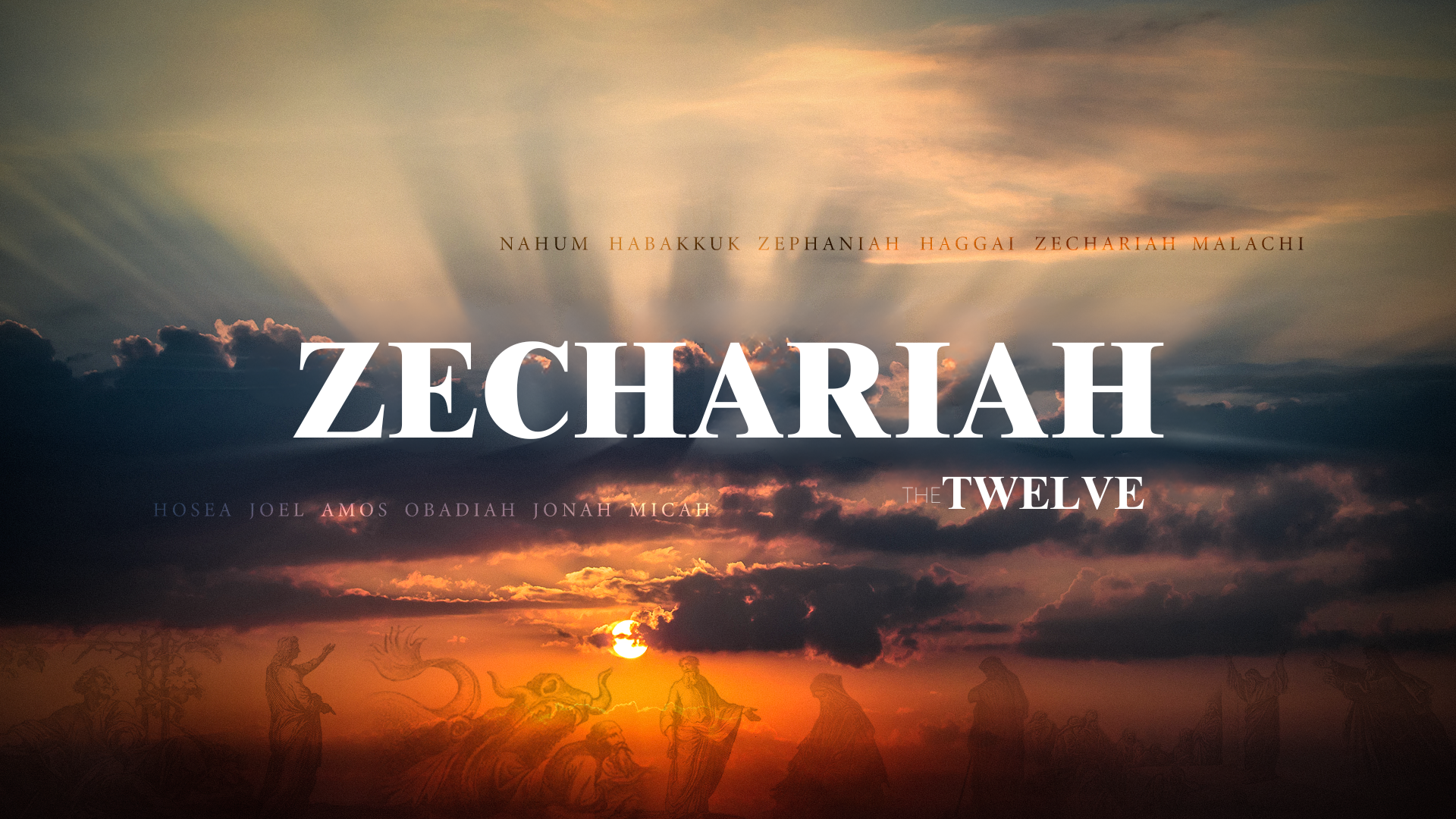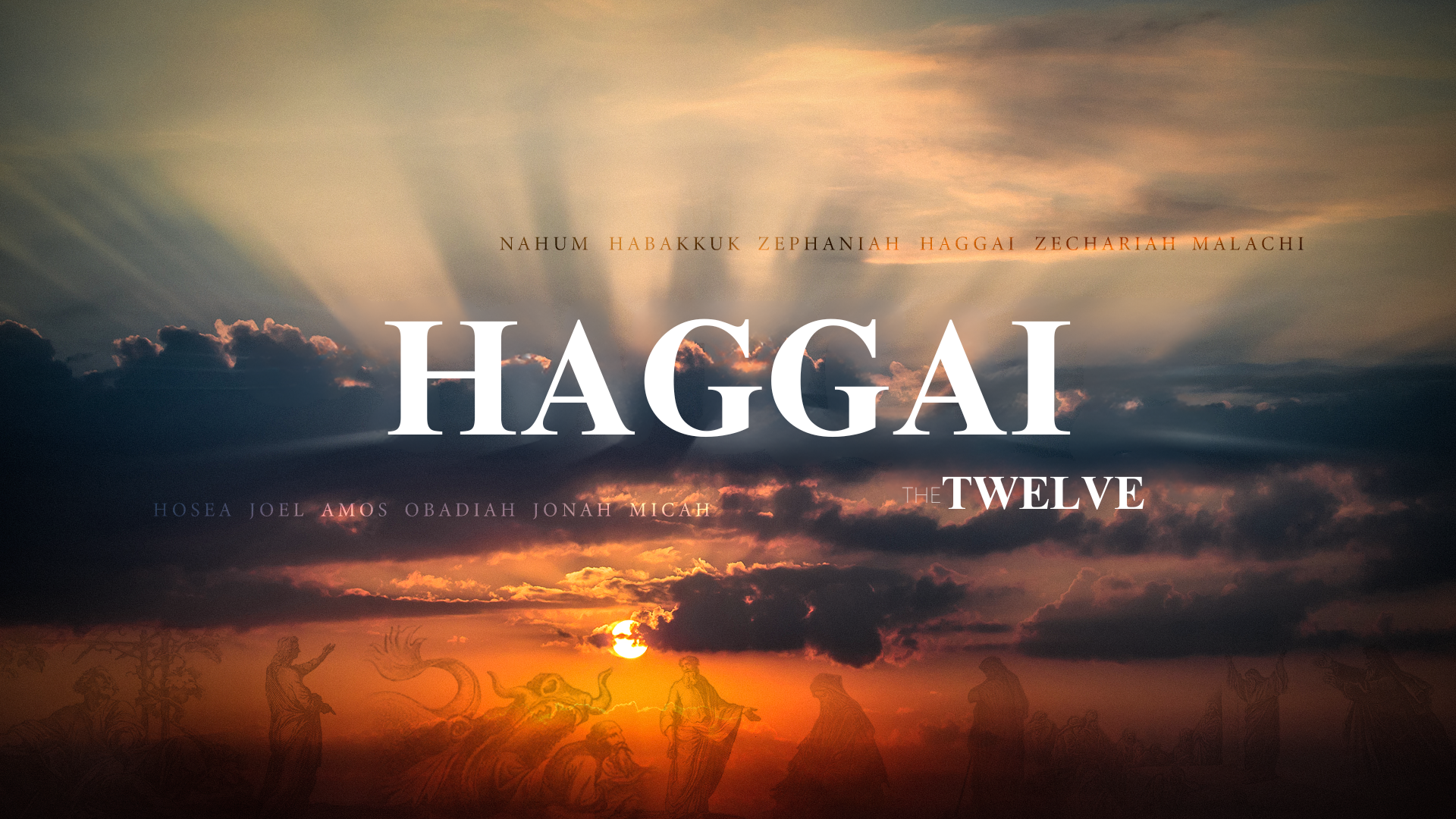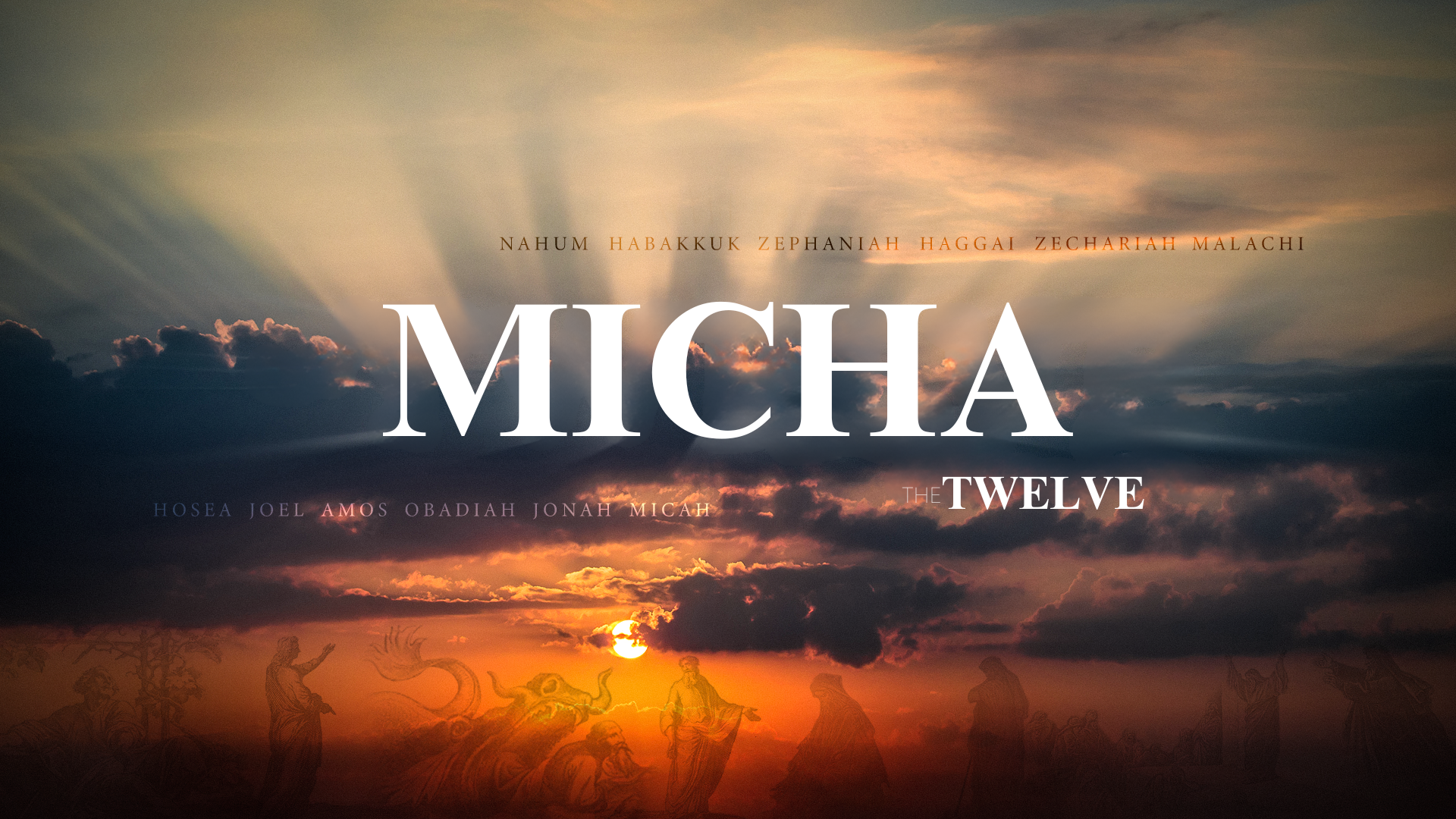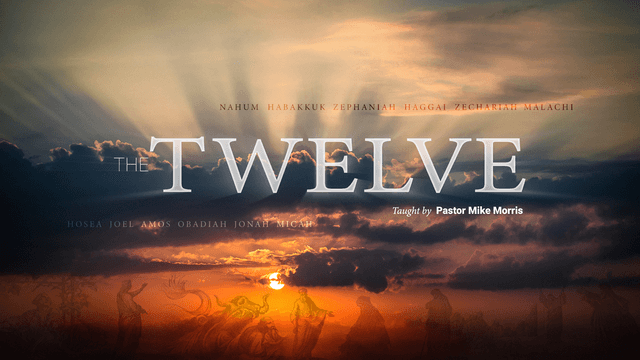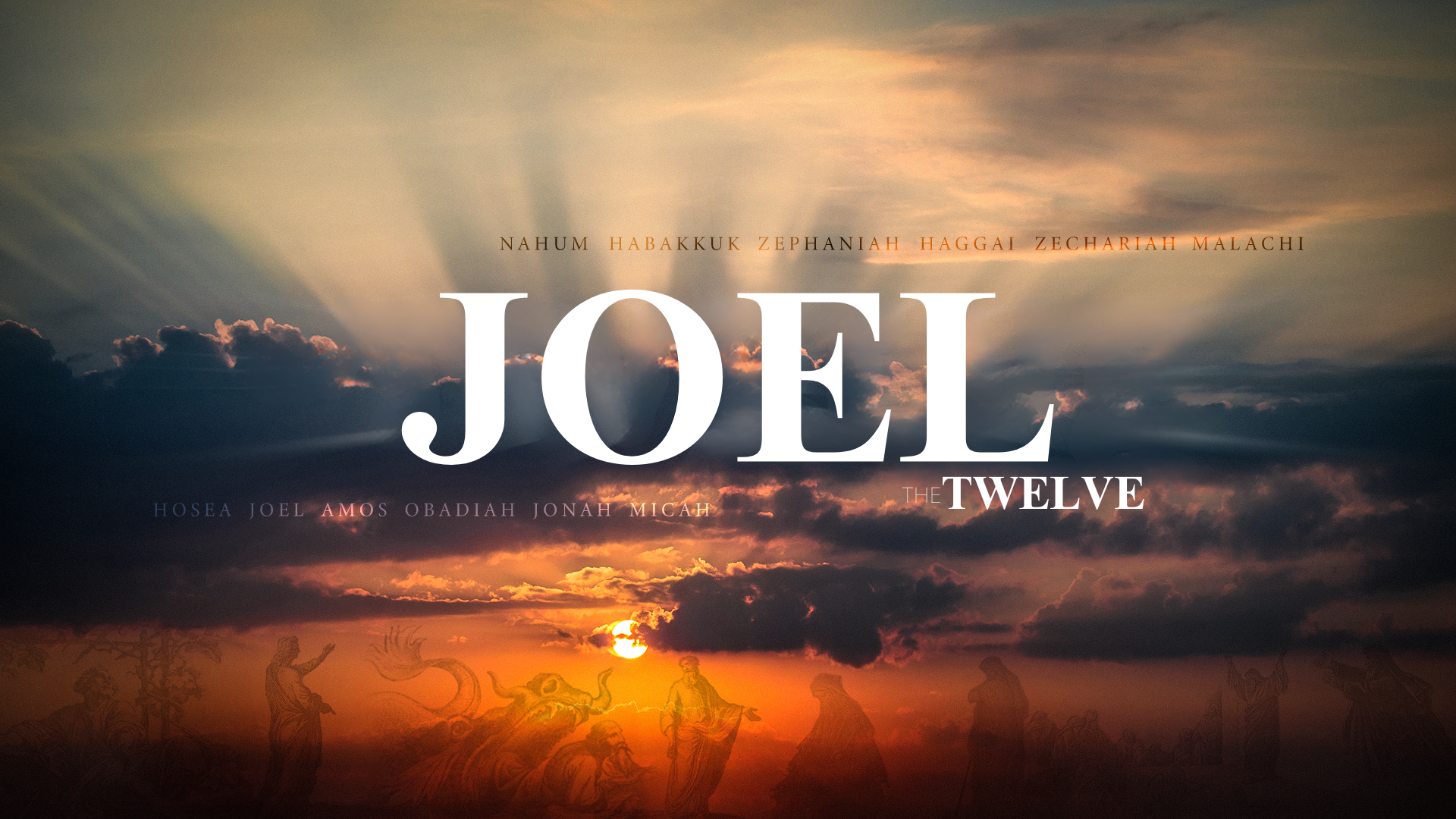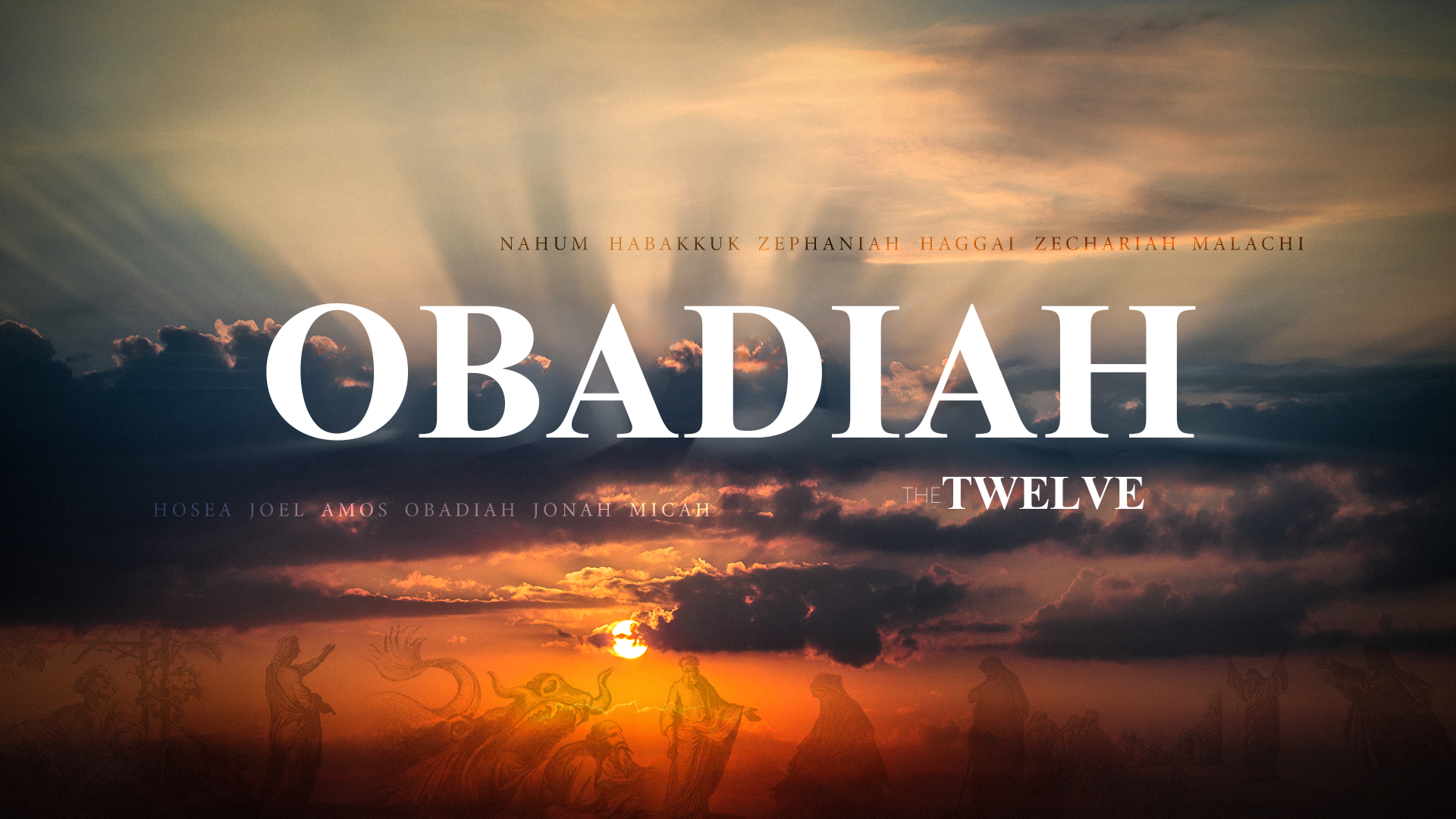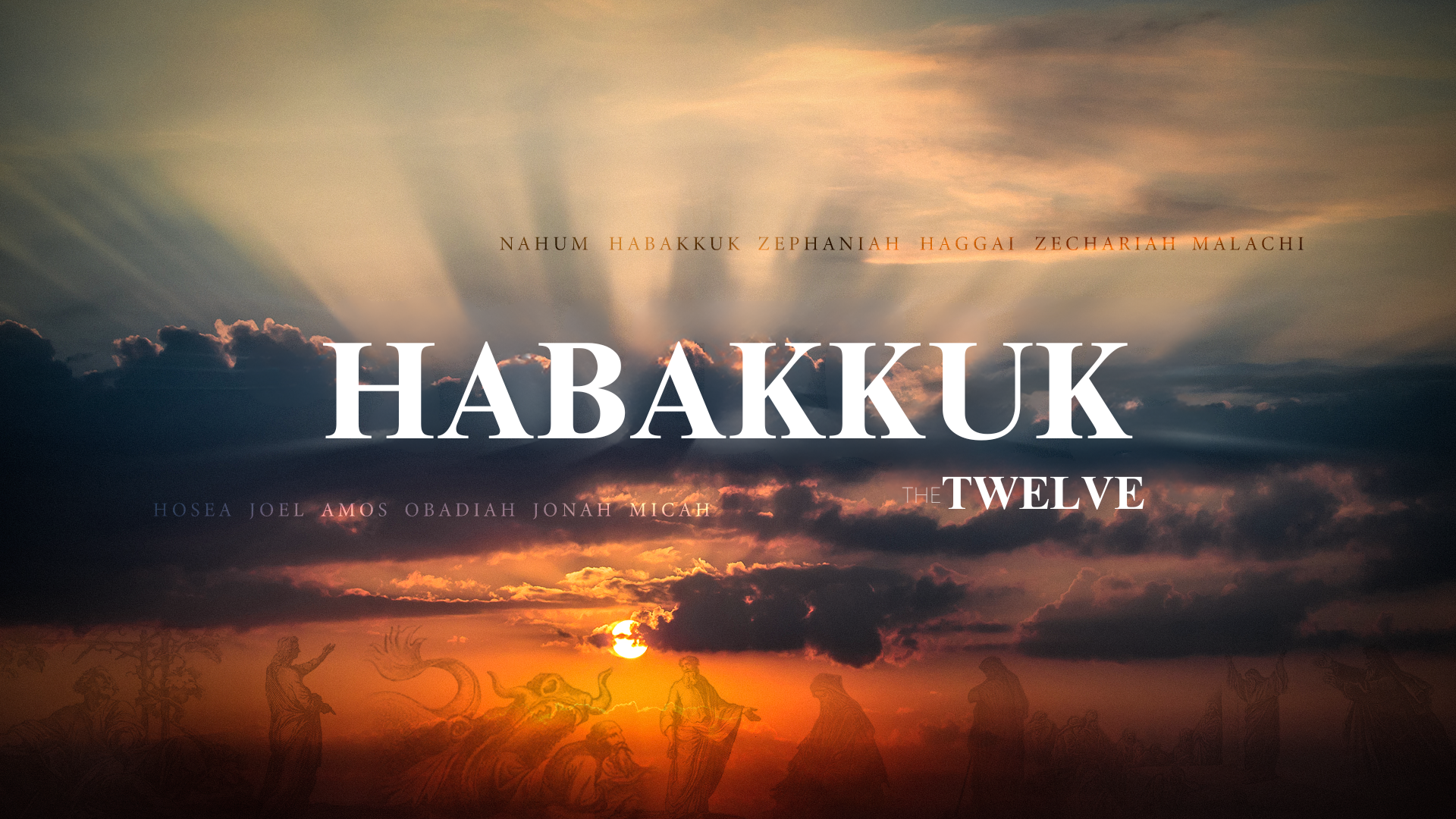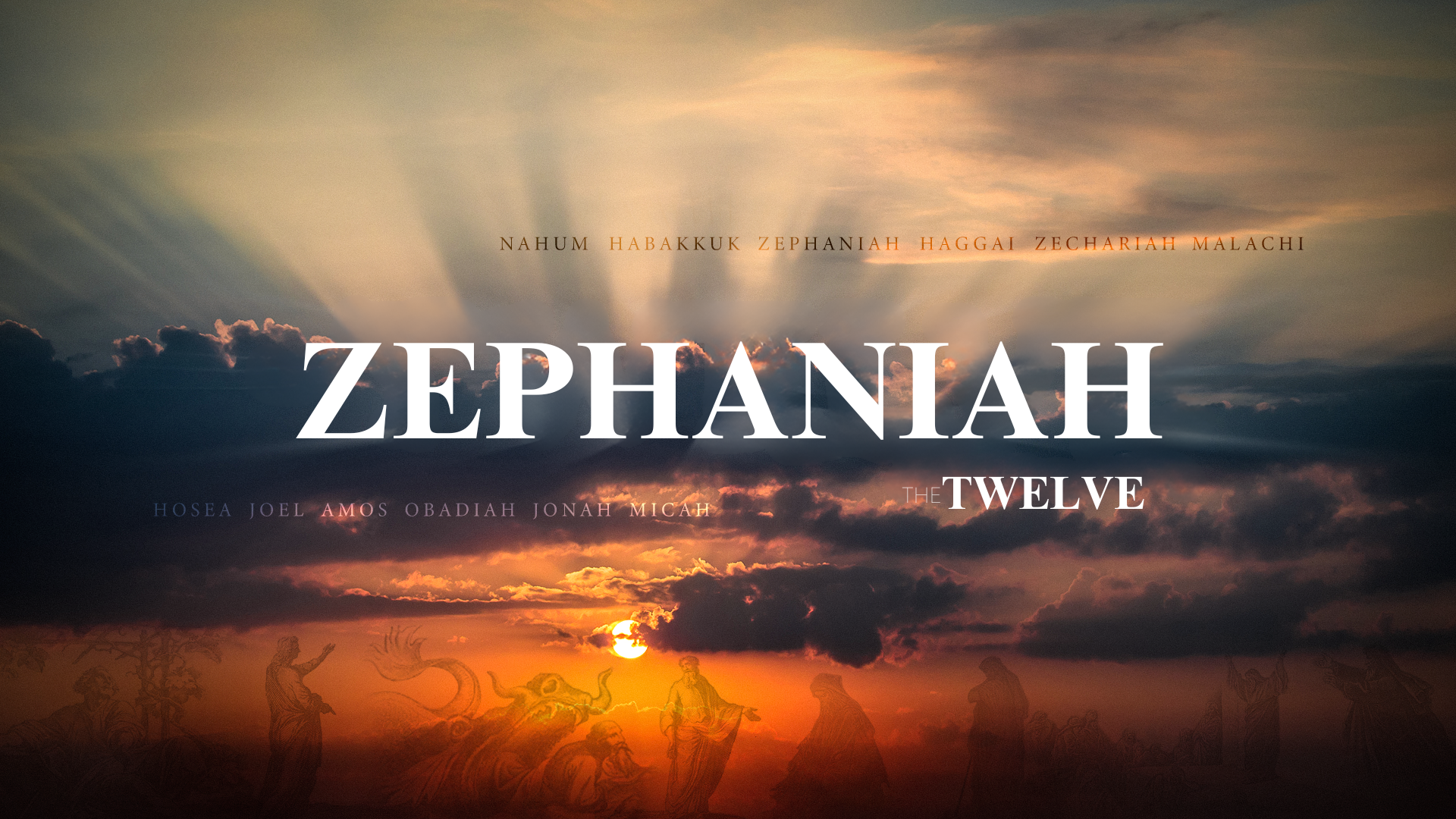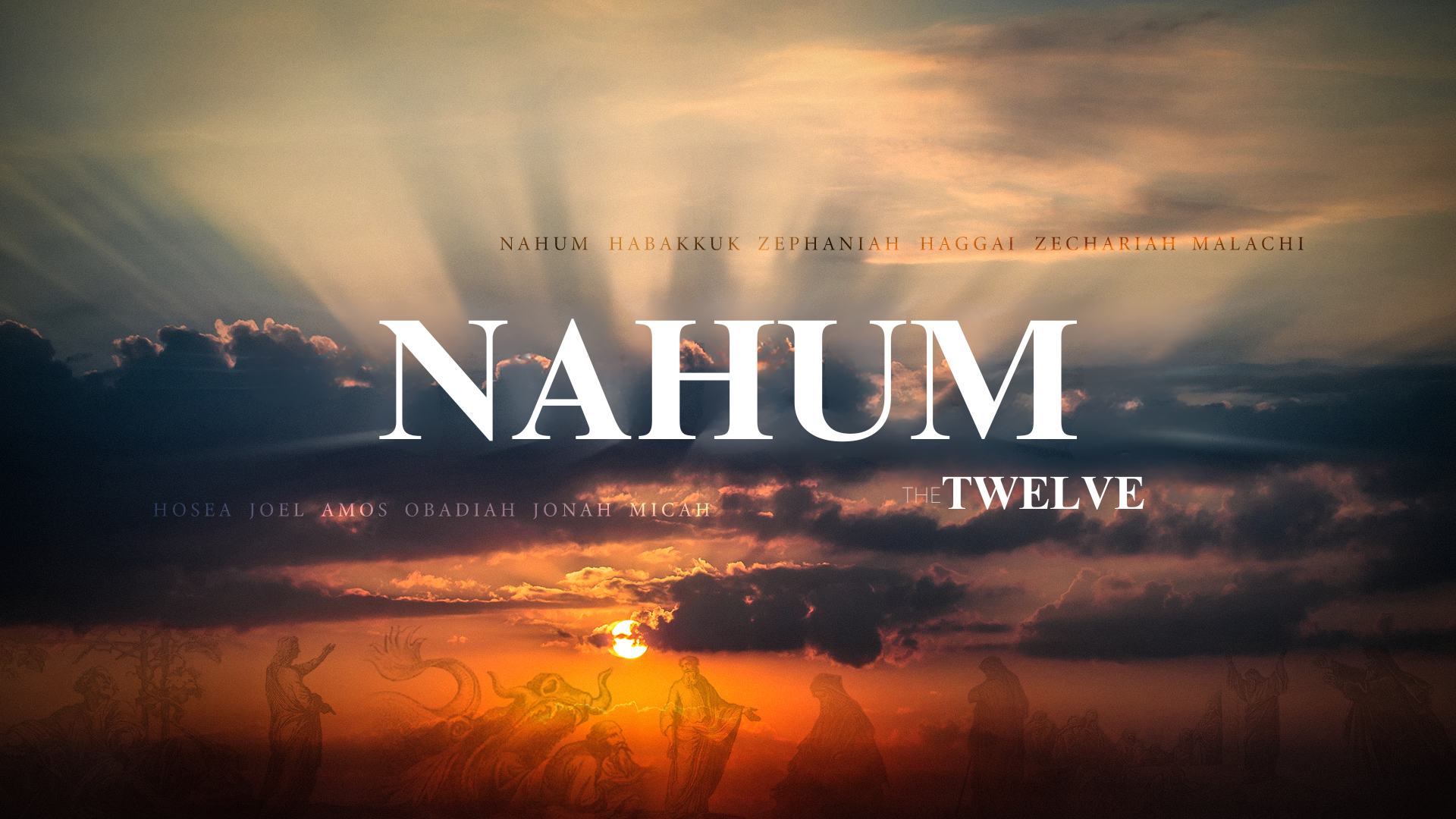MANUSCRIPT
Last week we completed our study of the book of Hosea...today we begin our study of the fourth book in the series “The Twelve”, the book of Micah...it’s the last book of the prophets to the northern kingdom of Israel...
Today we’ll cover the background of the book itself: the author, audience, date, national setting, structure, themes, and style or genre of the text...and we’ll consider this prophecy in the context of the time and space of the nations of Israel and Judah, their kings, and their spiritual conditions...for after Hosea, Micah is the last voice from God Israel hears before the judgment arrives in the form of the Assyrian warriors...
I believe this is the overarching vision of this book: the timing of the writing, the audiences, and the content, all indicate that the prophecy of Micah is a transitional moment, an inflection point, a message that transcends exclusively one kingdom or the other, but instead speaks to Israel in its last days, and applies the divine message of immediate judgment and ultimate restoration to Judah...Micah and his word from the Lord are the linchpin, the nexus point, between the experiences of Israel and Judah...Micah’s prophetic ministry spans the period of time that includes the fall of Samaria and Israel, and their exile into Assyria, and the beginning of Judah’s long descent into apostasy which would result in their exile into Babylon...note the identification of both capital cities in 1.1...
The word of the Lord that came to Micah of Moresheth in the days of Jotham, Ahaz, and Hezekiah, kings of Judah, which he saw concerning Samaria and Jerusalem.
Author: The author of the book is Micah of Moresheth (1.1); there is no serious debate about that issue; he is not the Micah of Judges 17; he is a native of Moresheth, a town in Judah, near the border of Philistia, particularly the royal city of Gath; it is in the same general area of Judah as Samson’s hometown, Zorah...Moresheth is located west of the Dead Sea, about 25 kilometers west-northwest of Jerusalem; Micah is mentioned and quoted in Jeremiah 26.18 for his prophecy to King Hezekiah about the judgment of Judah, which convinced King Hezekiah to repent, after which God relented of His judgment; he was apparently a respected prophet, but almost certainly not popular, since his message heavily emphasized judgment in the near-term, and restoration only as a far distant event; but he was very confident in God’s working in him, as we see in Micah 3.8...
But as for me, I am filled with power,
with the Spirit of the Lord,
and with justice and might,
to declare to Jacob his transgression
and to Israel his sin.
Audience: Micah’s target audiences were the political and economic capitals of both Israel and Judah...the entire population was included, but most directly the message was intended for the political and economic leaders and for the religious elite...since we know Micah preached to King Hezekiah in Judah, we know he was not only a writing prophet, but a preaching prophet as well...in the longer-term restoration portions of the book, the audience extends to all the people of God...messianic prophecies and ethical mandates, for example...but the immediate challenge and condemnation are for the ruling elite, in similar fashion to Amos and Hosea...
Date: the book was written in the eighth century B.C.; it begins with a very similar opening verse as Amos and Hosea, but unlike those two prophets, who dated their prophetic career by southern and northern kings, Micah only dates his by the southern kings of Judah...the reigns of these three kings, Jotham, Ahaz, and Hezekiah, were 4 yrs, 20 yrs, and 29 yrs...740 -- 687 B.C. -- Micah’s prophetic service would not include the full extent of the reigns of these kings...since he is quoted in Jeremiah as prophesying to Hezekiah, and we know that he was prophesying to both the capital cities -- Samaria and Jerusalem -- it is likely that most of his work was in the period 736 B.C. to 710 B.C. -- an extensive career for a prophet
National setting: The prophecy of Micah is the closing voice, the final word given to Israel, and a sober warning to Judah to learn from the disastrous sins of Israel and the appalling judgment executed upon them by the righteous covenant God...Micah stands in complete agreement with his predecessors Amos and Hosea more than a generation before...Micah was rebuking the northern kingdom and their leaders for the same sins as the previous two prophets...regarding Judah, Micah is a prophet of vivid warning and alarm...he urges the leaders in Judah to see what has happened with Israel, and take heed, to learn the lessons of the crushing defeat of Israel at the hands of the Assyrians, and understand how God is behind all that has happened with the northern kingdom...
Micah would completely agree with the perspective of the author of II Kings who saw theological and covenantal explanations for the conditions of the two kingdoms, and their eventual destruction and exile...II Kings 17.7-20
7 And this occurred because the people of Israel had sinned against the Lord their God, who had brought them up out of the land of Egypt from under the hand of Pharaoh king of Egypt, and had feared other gods 8 and walked in the customs of the nations whom the Lord drove out before the people of Israel, and in the customs that the kings of Israel had practiced. 9 And the people of Israel did secretly against the Lord their God things that were not right. They built for themselves high places in all their towns, from watchtower to fortified city. 10 They set up for themselves pillars and Asherim on every high hill and under every green tree, 11 and there they made offerings on all the high places, as the nations did whom the Lord carried away before them. And they did wicked things, provoking the Lord to anger, 12 and they served idols, of which the Lord had said to them, “You shall not do this.” 13 Yet the Lord warned Israel and Judah by every prophet and every seer, saying, “Turn from your evil ways and keep my commandments and my statutes, in accordance with all the Law that I commanded your fathers, and that I sent to you by my servants the prophets.”
14 But they would not listen, but were stubborn, as their fathers had been, who did not believe in the Lord their God. 15 They despised his statutes and his covenant that he made with their fathers and the warnings that he gave them. They went after false idols and became false, and they followed the nations that were around them, concerning whom the Lord had commanded them that they should not do like them. 16 And they abandoned all the commandments of the Lord their God, and made for themselves metal images of two calves; and they made an Asherah and worshiped all the host of heaven and served Baal. 17 And they burned their sons and their daughters as offerings and used divination and omens and sold themselves to do evil in the sight of the Lord, provoking him to anger. 18 Therefore the Lord was very angry with Israel and removed them out of his sight. None was left but the tribe of Judah only.
19 Judah also did not keep the commandments of the Lord their God, but walked in the customs that Israel had introduced. 20 And the Lord rejected all the descendants of Israel and afflicted them and gave them into the hand of plunderers, until he had cast them out of his sight.
What a sobering judgment and description of the sins of both Israel and Judah... demonstrates the close relationship between the historical and the prophetic books of the Old Testament...
Structure: Text breaks into three parts: chapters 1 and 2, chapters 3 through 5, and chapters 6 and 7...each begins with a call to “hear the word of the Lord”...within each of the portions there are alternating passages dedicated to oracles of judgment followed by hopeful passages which speak of restoration and renewal; there are several memorable passages, including the messianic prophecy that identifies the location of Messiah’s birth as Bethlehem Ephrathah, Micah 5.2...
But you, O Bethlehem Ephrathah,
who are too little to be among the clans of Judah,
from you shall come forth for me
one who is to be ruler in Israel,
whose coming forth is from of old,
from ancient days.
• And the well-known covenantal ethical mandate, Micah 6.8...
He has told you, O man, what is good;
and what does the Lord require of you
but to do justice, and to love kindness,
and to walk humbly with your God?
Themes: There are two dominant themes in this book, and they rest solidly in the center of the prophetic message across the Old Testament...
Sin: accusations, warnings, judgments: 1.2-2.11; 3.1-7; 3.9-12; 4.9-11; 5.1; 6.1-5; 6.9-16; 7.1-7
Hope: descriptions, prophecies, promises: 2.12-13; 3.8; 4.1-8; 4.12-13; 5.2-15; 6.6-8; 7.8-20
We have a remarkably clear depiction of the gospel in this prophetic book...there are many transparent and unflinching depictions of the sins of Israel, similar in many ways to the prophecies of Amos and Hosea...evidently few in Israel had heeded the prophetic message to repent and return to the Lord in the final generation or two prior to the Assyrian conquest...but more clearly than most OT prophecies, we see the birth and rising of the Messiah figure we know well from Isaiah, a contemporary of Micah...we see the Messiah’s birthplace only here, and we find him referred to as king in chapter 2...we see in chapter 4 the outlines of his reign, described by Micah as being in “the latter days”...we see him called “the shepherd” in chapters 5 and 7...and at the end of chapter 7, in the conclusion of the book, Yahweh is depicted as the covenant-keeping God who pardons iniquity and delights in steadfast love, forgiving the sins of Jacob because of His faithfulness to His own word to Abraham...for the Old Testament, this is a very Jesus-centered book
To summarize, despite the unrepentant hearts and grievous sins of the people and the judgment they deserve, that isn’t the end of the story...the Lord will raise up a righteous Shepherd-King for His people, restoring them to their place in the covenant and affirming the fidelity of God as the “I am” of Israel...
Style/genre: fairly normal prophetic structure -- “words which he saw” -- affirmation of the content of the book originating with Yahweh and not with the prophet, but only being delivered through the agency of the prophet...judgment oracles against Israel and their leaders, alternating with affirmations of great hope and ultimate restoration for the people...there is a definite near-term v. long-term sense to the text...we know from history that the judgments happened in the near-term, both for Israel and for Judah...the accusations against the ruling elite in both nations applied even as Micah spoke them...but the other more hopeful passages are much more distant on the timeline...the prophecy related to the birthplace of the Messiah was more than 700 years in the future when Micah spoke the words...so his was a combination of both forthtelling -- preaching and proclamation against the present-day sins of Israel -- and foretelling -- distant prophecies of the restoration and renewal of the people of God...this is a good example of the “two mountaintops” understanding of prophetic events in Scripture...
With that foundational information as background, let’s jump into the text in chapter 1 verse 2...
2 Hear, you peoples, all of you;
pay attention, O earth, and all that is in it,
and let the Lord God be a witness against you,
the Lord from his holy temple.
Micah begins his prophetic oracle with a simple yet profound call to all the earth: “Pay attention! Wake up!” Note that this message isn’t addressed to just Israel, or Judah, or anyone in particular -- this message is to all who dwell on the face of the earth...the Lord God has something to say...applies to us, as well...
Micah understood, as we should understand, that the Sovereign God is in control of all that takes place in His creation...He is not an absent God, Who created the heavens and the earth and then left us to live in accordance with our sinful natures...the Lord God will hold mankind accountable for our actions...and God is about to show up...
3 For behold, the Lord is coming out of his place,
and will come down and tread upon the high places of the earth.
4 And the mountains will melt under him,
and the valleys will split open,
like wax before the fire,
like waters poured down a steep place.
This is classic prophetic language...God speaks from His holy temple, His dwelling place, but He is coming out, down to the earth, and will “tread upon the high places of the earth” -- what does that description mean?
There are several things it could mean...literally, the mountains; symbolically, the “high places” represent the leaders of the earth, kings and emperors, religious leaders, capital cities, those who are high and lifted up; verse 5 would indicate this meaning...religiously, high places are synonymous with “every high hill” which served as locations for idolatrous worship in Israel and Judah...it represents judgment upon those places, a demonstration of God’s sovereign authority over the earth...He will walk on those places mankind considers high...and the effects are terrifyingly destructive...mountains melting and valleys split further open...God will crush those places and people in which mankind places trust in opposition to God...
What would cause God Almighty to bring forth His judgment in this way? The prophet tells us in verse 5 and following...
5 All this is for the transgression of Jacob
and for the sins of the house of Israel.
What is the transgression of Jacob?
Is it not Samaria?
And what is the high place of Judah?
Is it not Jerusalem?
God’s judgment is coming because of the transgression of Jacob and the sins of the house of Israel... “Transgression (Hebrew, peshah) means rebellion against God’s commands. It encompasses both the actions that violate God’s Word and the rebellious heart that wills those actions. The word for sin (Hebrew, hattat) means to be wayward and to fall short. ” Micah indicts both the north and the south...which would have shocked those in Jerusalem, who likely believed they were not vulnerable to God’s judgment for sin...
Here the focus is on the near-term: Israel’s apostasy, led by their capital, Samaria...
6 Therefore I will make Samaria a heap in the open country,
a place for planting vineyards,
and I will pour down her stones into the valley
and uncover her foundations.
7 All her carved images shall be beaten to pieces,
all her wages shall be burned with fire,
and all her idols I will lay waste,
for from the fee of a prostitute she gathered them,
and to the fee of a prostitute they shall return.
God speaks words of judgment over Samaria in this first oracle...
Samaria, the opulent capital city, built on a majestic hill, whose excessive luxuries were condemned by Amos, would be leveled, the land cleared of the palaces and buildings built by Omri and Ahab generations before so thoroughly that vineyards would be planted there, instead...and the stones removed from the foundations and scattered down the hillsides into the valleys surrounding the city...
The idols would be laid waste, symbolic of the powerless false gods they represented...and Micah notes the irony of the destruction God brought upon Israel...the fees, the money brought in to the idolatrous worship centers at Dan and Bethel and Gilgal and around the nation, where illicit sexual practices were part of the so-called “worship,” would eventually be taken into Assyria along with her people, and used in their pagan temples, given in worship to other false gods...from the fee of one prostitute to the fee of another...
This judgment brings Micah to his knees...he laments the destruction of Samaria and of Israel, but there is something else, perhaps to him even more crushing than the loss of the northern kingdom...it is that Samaria’s sin, her incurable wound, has found roots in Judah, his nation, as well...look at verse 9
8 For this I will lament and wail;
I will go stripped and naked;
I will make lamentation like the jackals,
and mourning like the ostriches.
9 For her wound is incurable,
and it has come to Judah;
it has reached to the gate of my people,
to Jerusalem.
This is the point that the prophecy serves as the moment of transition for the covenant people...a clear and compelling prophetic message from Amos and Hosea and Micah himself, had been given to multiple generations of the people of Israel, but they had turned their hard hearts away from God, ignoring His call to repent of their sin and return to Him...and now, having sown the wind, they would indeed reap the whirlwind...healing was possible in the days of Amos and Hosea, but now, Jacob’s wound is incurable...Israel is doomed, never to rise again to its former status as the covenant people of God...a remnant would survive, but they would no longer be the nation they once were
And worse, that incurable wound, that fatal disease, had spread to Judah...you can hear Micah’s breaking heart as he laments that it had reached “to the gate of my people, to Jerusalem.”
Micah looks at the full-blown spiritual idolatry and apostasy of Israel, and sees the beginning of the end for Judah as well...and so did Amos and Hosea before him...when you carefully look to see what Amos and Hosea said about Judah, it’s mostly negative...in Amos, two of three references addressed their sins and predicted judgment...in Hosea, 10 of 14 references addressed their sins and predicted judgment, in most cases linking Israel and Judah together...Hosea 5.5b and 12.2 are representative...
Israel and Ephraim shall stumble in his guilt;
Judah also shall stumble with them.
The Lord has an indictment against Judah
and will punish Jacob according to his ways;
he will repay him according to his deeds.
This is the key to the book...this connection between the present-day judgment of Israel and the coming, future judgment of Judah...through the Spirit, Micah sees it, laments over Israel, and warns Judah
Beginning in verse 10 through verse 15, Micah names eleven little-known or unknown locations, mostly in northern Judah...the intent of naming these places is to acknowledge that there will be lamentation in all of Judah when judgment falls on Jerusalem...”roll yourselves in the dust...in nakedness and shame...disaster has come down from the Lord to the gate of Jerusalem”
10 Tell it not in Gath;
weep not at all;
in Beth-le-aphrah
roll yourselves in the dust.
11 Pass on your way,
inhabitants of Shaphir,
in nakedness and shame;
the inhabitants of Zaanan
do not come out;
the lamentation of Beth-ezel
shall take away from you its standing place.
12 For the inhabitants of Maroth
wait anxiously for good,
because disaster has come down from the Lord
to the gate of Jerusalem.
13 Harness the steeds to the chariots,
inhabitants of Lachish;
it was the beginning of sin
to the daughter of Zion,
for in you were found
the transgressions of Israel.
14 Therefore you shall give parting gifts
to Moresheth-gath;
the houses of Achzib shall be a deceitful thing
to the kings of Israel.
15 I will again bring a conqueror to you,
inhabitants of Mareshah;
the glory of Israel
shall come to Adullam.
The key to this list of locations is in the latter half of verse 13 where Micah declares that in Zion was found the transgressions of Israel...another example of the linking, the connection in this book between the judgment of Israel and the peril of Judah...
The final statement in the chapter speaks to an ancient practice of mourning -- cutting off of a person’s hair...parents in the northern and southern kingdoms would shave their heads in mourning as their children were taken into exile along with the rest of the nation...
16 Make yourselves bald and cut off your hair,
for the children of your delight;
make yourselves as bald as the eagle,
for they shall go from you into exile.
As we reflect on this opening chapter of the book of Micah, there are some lessons for us to learn and apply...
For Bible students, we need to realize the importance of context not just for a passage within the text of a single book, but also for a book within the context of the testament in which it appears...seeing a book in its historical setting is truly the only way to understand its importance and meaning within the whole of Scripture...
We need to see our world, and the events of our world, through the same lens as Micah and the historical authors of the Old Testament...historical events don’t “just happen” -- they have to be seen in the context of the work and purpose of the sovereign God...the Lord God is still on His throne and still governing His creation...we see it in the Exodus, in the conquest of Canaan, in the judgment and exile of Israel and Judah, in God’s use of both Assyria and Babylon to do His will, in the timing and setting for the ministry of Jesus Christ, in God’s direction of Paul in his missionary journeys, and in His work in drawing history to its appointed end in the book of Revelation...we see it throughout all of the history of the church...why don’t we see it in our own day? Jesus said of the Pharisees and Sadducees in Matthew 16.3...”You know how to interpret the appearance of the sky but you cannot interpret the signs of the times.” ... would He say the same of us? How do we understand the times in which we live?
And finally, this: when the Lord gives you the chance to learn from the trials and judgments He brings to others, take it...repent and return to Him

Taught by Mike Morris
Associate Pastor of Verse By Verse Fellowship
The Twelve Series
